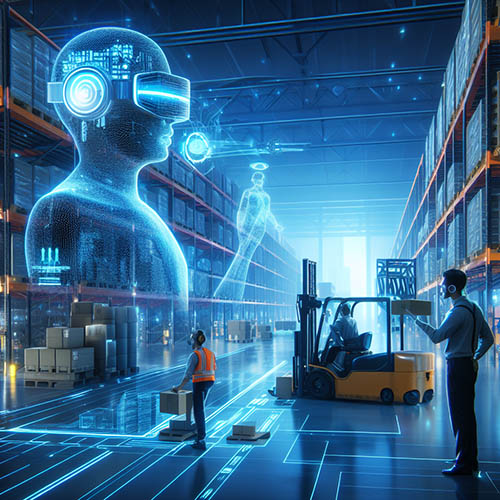AI is being deployed across a wide range of industries to optimize warehouse operations, enhance efficiency, reduce costs, and improve overall logistics. Here’s how AI is being utilized in warehouses within various sectors:
1. Tech Industry:
- Inventory Management: AI algorithms predict demand for tech components and products, allowing for better inventory control and reduced overstocking.
- Quality Control: Computer vision systems powered by AI inspect electronic components and devices for defects with high accuracy and speed.
- Routing and Optimization: AI-driven systems optimize the routing of tech products within warehouses, reducing travel time and increasing throughput.
2. Automotive Industry:
- Parts Sorting: AI-driven robots and vision systems efficiently sort and organize automotive components, ensuring accuracy and minimizing errors.
- Supply Chain Management: AI predicts demand for automotive parts, helping manufacturers and warehouses optimize inventory levels.
- Predictive Maintenance: AI analytics predict when machinery and equipment in the warehouse, such as forklifts, need maintenance, reducing downtime.
3. E-commerce Industry:
- Demand Forecasting: AI analyzes historical data to forecast product demand, assisting e-commerce companies in stocking warehouses appropriately.
- Packing and Shipping: Robots equipped with AI capabilities pick, pack, and label products for shipment, increasing efficiency and accuracy.
- Personalization: AI algorithms optimize the placement of products within the warehouse for efficient order picking based on customer preferences.
4. Health and Medicine Industry:
- Pharmaceutical Warehouses: AI manages the storage and distribution of medications and medical supplies, ensuring timely delivery and minimizing waste.
- Medical Device Inventory: AI helps healthcare facilities manage the inventory of medical devices and equipment, ensuring essential items are always in stock.
- Temperature Monitoring: AI-powered sensors monitor the temperature of sensitive medical supplies and alert warehouse staff to deviations that could affect product quality.
5. Shipping and Transportation Industry:
- Route Optimization: AI algorithms optimize delivery routes for shipping companies, reducing fuel consumption and improving delivery times.
- Parcel Sorting: AI-powered systems automate parcel sorting in distribution centers and courier hubs, enhancing speed and accuracy.
- Predictive Maintenance: AI helps predict maintenance needs for shipping and transportation equipment, reducing downtime and repair costs.
6. Retail Industry:
- Inventory Optimization: AI predicts consumer demand and optimizes retail store and distribution center inventory levels.
- Visual Merchandising: AI-driven analytics assist in planning product placements in retail stores for improved customer engagement.
- Supply Chain Visibility: AI provides real-time visibility into the entire supply chain, enhancing inventory management and demand forecasting.
7. Manufacturing Industry:
- Material Handling: AI-powered robots and automated guided vehicles (AGVs) handle material transport within manufacturing facilities.
- Quality Assurance: AI systems inspect and detect defects in manufacturing components, ensuring product quality.
- Inventory Control: AI manages raw material and finished product inventory levels for just-in-time production.
8. Pharmaceutical Industry:
- Supply Chain Optimization: AI optimizes pharmaceutical supply chains, ensuring the timely delivery of medicines and reducing waste.
- Regulatory Compliance: AI helps pharmaceutical warehouses comply with stringent regulatory requirements for temperature control and product tracking.
- Order Fulfillment: AI-driven systems automate and enhance the accuracy of order picking and packing processes.
In each of these industries, AI technologies such as machine learning, computer vision, natural language processing, robotics, and IoT sensors play vital roles in transforming warehouse operations. AI analytics provide valuable insights into warehouse performance, enabling continuous improvement and cost savings.

